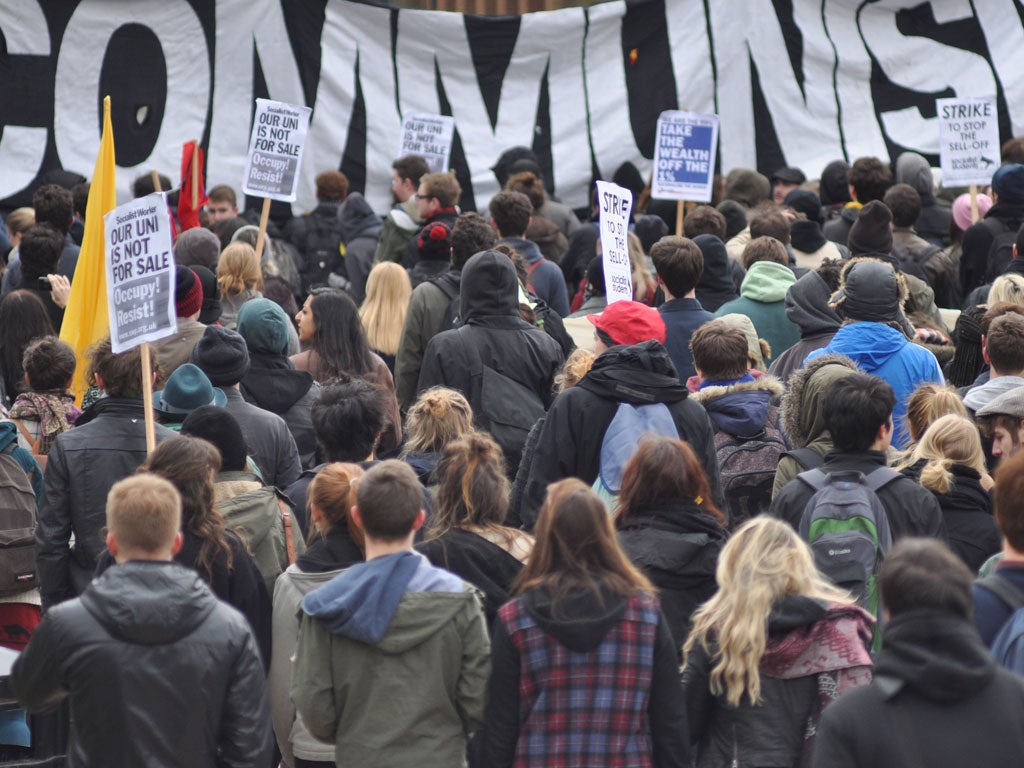Is student politics alive and kicking?
With a student protester arrested in London earlier this week, Hannah Dewhirst worries that students lack the platform to make themselves heard in this country

Accusations over disproportionate police force in the arrest of a student protester earlier this week are proof that many students are doing anything but lazing around in the sun during their holidays. The 25-year-old now being held on suspicion of criminal damage was taking part in the University of London Union’s 3 Cosas campaign. Fighting for staff suffering the outcomes of privatisation on sick leave, holiday and pensions, it’s the latest spontaneous movement demonstrating that student political activism is undergoing its biggest revival in a generation.
It follows a prominent 10-month campaign against privatisation at the University of Sussex, which culminated in a national demo on 25 March. With over 1,000 attendees and an address from local Green MP Caroline Lucas, the march was mostly a success.
First-year medic Alicja Beksinska recalls that ‘it felt like a real chance to join students from all over the country and make ourselves heard’.
“Sadly the divisions between communists, socialists and anarchists quickly became apparent. The smashing of a glass door in Sussex House caused many students to distance themselves from the march."
Four students were arrested after the demos.
University protests certainly aren’t new; 1960s CND marches marked students as politically radical, passionate, though often naïve. The biggest issue facing current students are £9,000 tuition fees, the distressing reaction to which entered the nation’s consciousness in 2010. Those November protests drew up to 50,000 people onto the streets of London alone but also ended in property destruction when thousands surrounded Conservative Party Campaign Headquarters at 30 Millbank. Smashed windows, fires and occupation led to arrests including Brockenhurst College student Edward Wollard, who threw a fire extinguisher off the roof and received 32 months in prison.
While commentators criticised young people for causing trouble, it’s important not to mistake these destructive few as representative of the disgruntled many. Following cuts to Educational Maintenance Allowance, surging youth unemployment and new talk over student loan privatisation, it’s easy to understand why the current generation feel government has left them financially hung out to dry.
Earlier this month, treasury secretary Danny Alexander announced that Britain would ‘sell off £15bn of public assets by 2020’, £10bn of which ‘will come from corporate and financial assets like the student loan book’. This was in a Commons speech ironically entitled ‘Investing in Britain’s future’. It’s not clear whether this means selling off past students’ debt or completely privatising the Student Loan Company. While past legislation capped pre-2012 loan repayment rates at 1.5 per cent, a secret government report revealed by the Guardian last month, might change this.
The document, conducted by Rothschild bank, argued the cap would deter potential ‘investors’ so governments should remove it or make up the shortfall with a public purse pay-out. The report even offered ministers a possible line of defence: ‘We all live in difficult times, but you have a deal which is so much better than your younger siblings (they’ll incur up to £9,000 fees and RPI+3 per cent interest rates)’. This, however, will not comfort young adults already struggling with rising rents and falling living standards.
So how can students respond? While the NUS represents more than seven million members, the organization’s effectiveness is under question. The last ‘success’ toted on its website was preventing HSBC from ending interest-free student overdrafts in 2007. While helpful, instances like this expose what the association really is, not a political body but a consortium of young people’s commercial interests, best reflected in their NUS extra card. £12 a year will secure discounts on brands such as Dominos, Superdrug and book giant Amazon. I’m not dismissing the card - every small saving helps – but its existence reduces NUS from a sturdy political platform to little more than a coupon book.
Some students even launched www.theyworkforstudents.co.uk, aimed at increasing scrutiny and accountability at NUS. The site published their 2011-14 Strategic Plan outlining 20 key goals, including the vague promise ‘student financial support will be fairer and simpler across higher and further education, with more support for people who need more help’. This doesn’t seem to have stopped development of above privatisation plans. The NUS’s reaction, you ask? Well, they just launched a new logo.
But young people don’t seem to be turning to political parties with their outrage. Conservative, Labour and Lib Dem membership has declined for decades, with Lib Dems suffering 25 per cent drop in 2010 alone, while parliamentary alternatives carry less favour: UKIP is at 30,000 and the Greens have 16,000. Although Green policies might best mobilize and benefit students with renationalised cheaper public transport and tuition fees eliminated, they carry little recognition outside Brighton. The failure of parties to recruit youth members forces their policies to instead pursue the elderly and middle class – the ones who vote the most and the ones who spend the most.
So in lacking representation from traditional political parties or their own union, where can young people turn? They could get involved in single issues but last month’s lobbying scandal has diminished pressure groups’ power in parliament. What’s clear is that current students and young people have just as many - if not more - concerns than previous generations. What they lack is the right vehicle to express them and until that arrives, youth issues will continue to fall by the political wayside.
Subscribe to Independent Premium to bookmark this article
Want to bookmark your favourite articles and stories to read or reference later? Start your Independent Premium subscription today.

Join our commenting forum
Join thought-provoking conversations, follow other Independent readers and see their replies